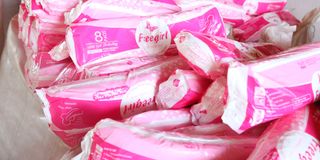Period of change: Why Women Reps are taking over sanitary towels programme

Kenya's free sanitary rollout has been plagued by numerous obstacles including supply shortages, quality issues, and distribution problems.
What you need to know:
- The free sanitary towels programme for schoolgirls has faced numerous challenges including supply shortages, quality issues, and distribution problems.
- An audit found the Ministry of Education did not provide sufficient sanitary towels to all girls who needed them.
- County woman representatives will now oversee the management of the programme's Sh940 million budget.
When the Kenyans government introduced the free sanitary towels programme for schoolgirls in Kenya, many hailed the initiative as a crucial step towards gender equality in education. Its major aim was to keep girls in class during their periods.
However, the rollout has been plagued by numerous obstacles, from supply shortages to issues with quality and distribution. As the nation grapples with these challenges, many girls across the country continue to face difficulties in managing their menstrual health, hindering their ability to attend school and undermining the programme's noble goals.
And now report on budget estimates for the State Department for Gender and Affirmative Action for the next financial year says county woman representatives will take over the management of a Sh940 million sanitary towels programme. This change follows recommendation by the Social Protection Committee of the National Assembly, which cited organisational weaknesses in the current regime as the reason for the shift.
An overview of an Auditor General’s report on the sanitary towels programme details how the funds, currently managed by the Ministry of Education (MoE), have been disbursed over the past three years and highlights the said ‘organisational weaknesses’.
Read also: Where are the free pads for schoolgirls?
The audit, which covers the 2019/20, 2020/21, and 2021/22 financial years, found that the MoE did not provide sufficient sanitary towels to every girl enrolled in a public primary school. Each year, the ministry was to provide nine packets of sanitary towels to each girl who had reached puberty. However, the programme only distributed seven pads annually to each girl.
The Auditor General’s office reviewed issuance lists in sampled schools and found that girls in classes One to Five who had attained puberty, were also receiving sanitary towels. Since this category was not factored into the initial budget, schools had to share the allocated towels among all girls who had reached puberty, reducing the number of packets available for each girl.
This means some of the girls registered to receive the towels did not receive them. The report indicates that the MoE was supposed to allocate sanitary towels to schools based on the enrolment data of girls in classes Six to Eight. For instance, there was a significant deficit of 6,642 sanitary towels in the 2021/22 financial year.
According to the Menstrual Hygiene Management Strategy 2019 to 2024, the MoE was to develop guidelines to ensure the distribution of sanitary towels was seamless, and that the pads distributed were safe and of good quality. However, the audit found that the distribution was irregular, with no prior communication on the next delivery date.
However, a nation.africa article titled: Periods of Despair: The plight of school girls conducted a spot check at several schools in Nairobi and Kiambu, and found that some institutions had not received sanitary towels for a while.
Leaders including Kirinyaga County Woman representatives have welcomed the change saying there have been accusations of misapplication and mismanagement of the kitty while it rotated in various ministries.
“I believe in having the county members of Parliament oversee its implementation to ensure accountability and application on a need basis. I look forward to seeing options like local manufacturing that will also create employment opportunities in the value chain,’’ Jane Maina told nation.africa.
How will the management of sanitary pads differ now that it’s moving from the Ministry of Education to the State Department for Gender? National Government Affirmative Action Fund (Ngaaf) CEO Roy Telewa says: “Moving the sanitary pads programme to the State Department for Gender, Arts, and Culture aligns it with its proper mandate, leveraging the existing structure for better efficiency in distribution and stakeholder engagement. Women members of Parliament, who advocate menstrual hygiene, can amplify their voices more effectively,’’ Mr Telewa told nation.africa.
He also explained how distribution will be managed across the 47 counties.
“The ministry is developing a framework based on the number of schools in each county, which has been the basis for previous distributions. If there are changes, the framework will be reviewed accordingly. Currently, there is no vacuum since the existing framework is still in use.’’
He attributed discrepancies in the number of girls receiving sanitary pads in Auditor General’s report to inadequate budget, which he says will be enhanced in the coming financial year.
The Sanitary Towels programme was launched in 2011 in fulfilment of section 2(k) often Basic Education (Amendment) Act 2017.





